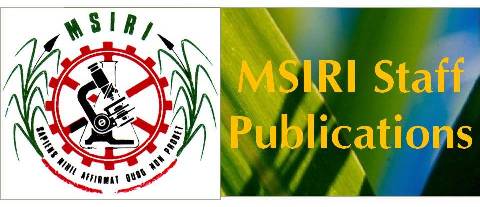Irrigation de la canne à sucre en situation de manque d'eau: stratégies de gestion
| MSI10P4453 | |
| Teeluck, M. Ng Cheong, L. R. Ah Koon, P. D. Ratna, R. D. Muthy, N. K. | |
| Irrigation de la canne à sucre en situation de manque d'eau: stratégies de gestion | |
| periodical article | |
| 2007 | |
| Revue agric. sucr. Ile Maurice | |
| 86(1): 38-46 | |
| Published 2009 | |
| Fr | |
| En Fr | |
| Sugar cane planters are faced with a recurrent problem of irrigation water shortage during the months of September to December. This shortage of water, which is more severe in the North and West of Mauritius from where some 30per cent of the total sugar production emanates, occurs at a time when the crop water requirement is about 6 mm per day. In other areas of the sugar industry with adequate water supply, competition for water is increasing because of increasing demands from others sectors of the economy. Management of irrigation water is therefore of utmost importance and requires an innovative and sustainable approach. This paper elaborates on irrigation management strategies aimed at improving overall farm productivity when water is scarce. These strategies, based on research findings that have been implemented in the sugar cane industry comprise the following: commercial application of deficit irrigation practices, improvements in irrigation methods to reduce wastage of water and the use of wastewaters for irrigation. Results of deficit irrigation trials have shown that it is possible to stretch the available water to an additional 11 per cent of unirrigated area, thereby increasing water-use efficiency by 10per cent and overall cane productivity by 2.4per cent. Furthermore, adoption of improved irrigation systems like the centre pivot and the application the software IRRIPIVO has been shown to improve overall commercial yield by about 14per cent. Irrigation with factory wastewater produced similar cane yield increases as with clean water, but its quality has to be closely monitored to avoid adverse effects on the soil and on irrigation equipment. An integrated approach in irrigation water management with the implementation of a GIS-based Irrigation Management Information System (IMIS) is also proposed. Such an approach will assist irrigation managers in optimizing water use, labour and equipment inputs and will further enhance productivity per unit of water consumed. | |
| sugarcane irrigation deficit irrigation waste waters integrated approach | |
| Mauritius | |
| Sugarcane: Water use and management | |
| Irrigation: Deficit irrigation | |
| 2010-02-03 | |
| En | |
| LIB | |
| CAT | |
| IRRIG |
